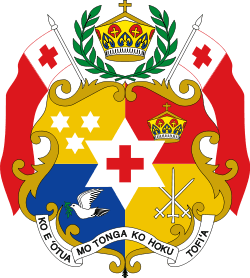Legislative Assembly of Tonga
The Legislative Assembly (Tongan: Fale Alea) of Tonga has 25 members in which 17 members elected by majority of the people for a 5-year term in multi-seat constituencies via the single non-transferable vote system. There are 8 members elected by the 33 hereditary nobles of Tonga. The Assembly is controlled by the speaker of the House who is elected by majority of the elected members of Parliament and constitutionally appointed by the king.
Legislative Assembly of Tonga Fale Alea | |
|---|---|
.svg.png) | |
| Type | |
| Type | |
| Leadership | |
Speaker | Fatafehi Fakafanua since December 2017 |
| Structure | |
| Seats | 25 members |
 | |
Political groups |
|
| Elections | |
| multi-seat constituency | |
Last election | 2017 Tongan general election |
| Meeting place | |
| Nukuʻalofa | |
| Website | |
| parliament | |
 |
|---|
| This article is part of a series on the politics and government of Tonga |
| Constitution |
|
Monarchy
|
|
Executive |
|
Legislative |
|
Judiciary |
|
Elections
|
| Administrative divisions |
|
|
History
A Legislative Assembly providing for representation of nobles and commoners was established in 1862 by King George Tupou I.[1] This body met every four years and was continued in the 1875 Constitution.
Originally the Legislative Assembly consisted of all holders of noble titles, an equal number of people's representatives, the governors for Ha’apai and Vava’u, and at least four Cabinet Ministers chosen by the monarch.[2] An increase in the number of nobles from twenty to thirty saw the Assembly grow to 70 members.[3] Amendments in 1914 saw a reduction in the size of the Assembly and annual sittings. The principle of equal representation of nobles and commoners was retained.[4]
In April 2010 the Legislative Assembly enacted a package of political reforms, increasing the number of people's representatives from nine to seventeen,[5] with ten seats for Tongatapu, three for Vava’u, two for Ha’apai and one each for Niuas and 'Eua.[6]
The 100-year-old Tongan Parliament House was destroyed by Cyclone Gita, a Category 4 tropical cyclone that passed through the nation on 12 and 13 February 2018.[7]
Speaker of the Assembly
The Legislative Assembly is presided over by a Speaker, who is elected by the MPs at the first meeting of elected members after the general election.[8] Prior to 2010, the Speaker was appointed by the monarch.[9]
A complete list of the Speakers is below:[10][11]
| Name | Took office | Left office | Notes |
|---|---|---|---|
| Hon. Viliami Tungi | 1875 | 1896 | |
| Hon. Siaosi Tuku'aho | 1897 | 1897 | |
| Hon. Siaosi Tu'ipelehake | 1897 | 1912 | |
| Hon. Finau 'Ulukalala | 1912 | 1938 | |
| Hon. Iosaiasi Veikune | 1939 | 1940 | 1st term |
| Hon. Tu'ivakano | 1941 | 1941 | 1st term |
| Hon. Nuku | 1942 | 1944 | |
| Hon. Iosaiasi Veikune | 1945 | 1945 | 2nd term |
| Hon. Tu'ivakano | 1946 | 1948 | 2nd term |
| Hon. Iosaiasi Veikune | 1949 | 1949 | 3rd term |
| Hon. Tu'ivaikano | 1950 | 1950 | 3rd term |
| Hon. Kalaniuvalu | 1951 | 1958 | |
| Hon. Ma'afu Tukui'aulahi | 1959 | 1984 | |
| Hon. Kalaniuvalu Fotofili | 1985 | 1986 | |
| Hon. Malupo | 1987 | 1989 | |
| Hon. Fusitu'a | 1990 | 1998 | [12] |
| Hon. Veikune | April 1999 | 2001 | 1st term |
| Lord Tuʻivakanō | 1 July 2002 | 2004 | 1st term |
| Hon. Veikune | 22 March 2005 | January 2006 | 2nd term |
| Hon. Havea Tui'ha'angana | 10 February 2006 | April 2008 | [13] |
| Hon. Tu'ilakepa | 2 May 2008 | 2010 | |
| Lord Tupou (interim) | 3 December 2010 | 21 December 2010 | [14] |
| Hon. Lasike | 21 December 2010 | 18 July 2012 | |
| Lord Fakafanua | 19 July 2012 | 29 December 2014 | 1st term |
| Lord Tuʻivakanō | January 2015 | December 2017 | 2nd term |
| Lord Fakafanua | December 2017 | 2nd term[15] |
Terms of the Tongan Legislative Assembly
Until 2010, the government was appointed by the monarch without reference to Parliament, and there were no political parties. The last term under the old system was the 2008 Tongan Legislative Assembly. Political reform in 2010 saw the Prime Minister elected by Parliament from among its members, leading to responsible government.
| Term | Elected in | Government |
|---|---|---|
| 2010 Parliament | 2010 election | Independent |
| 2014 Parliament | 2014 election | No overall majority |
| 2017 Parliament | 2017 election | DPFI |
Officers
Clerk (Kalae Pule Falealea 'o Tonga)
- Sione Tekiteki (2011–2012)
- Gloria Pole'o (2012–present)
Legislative Procedures
References
- David Stanley (1999). Tonga-Somoa Handbook. p. 198. ISBN 978-1-56691-174-0.
- Ian Campbell (2005). "The Quest for Constitutional Reform in Tonga". Journal of Pacific History. 40 (1): 91–104. doi:10.1080/00223340500082400.
- Campbell (2005), p. 93.
- Sione Latukefu. "History of our Constitution". Government of Tonga. Retrieved 2010-03-02.
- "Tonga Parliament enacts political reforms". Radio New Zealand International. 2010-04-15. Retrieved 2010-04-21.
- "Tonga parliament votes on amended boundaries". Radio New Zealand International. 2010-04-20. Retrieved 2010-04-21.
- "Tonga parliament building flattened by Cyclone Gita". BBC News. 13 February 2018.
- "FAQs".
- Constitution of Tonga Archived 2008-11-19 at the Wayback Machine, s. 61
- "List of Speakers of the Tongan Legislative Assembly".
- This is drawn from Member profiles on the Legislative Assembly's official website
- "Lord Fusitu'a passes away".
- http://archive.ipu.org/parline-e/reports/arc/2317_05.htm
- http://archive.ipu.org/parline-e/reports/arc/2317_10.htm
- "Tongan Parliament elects Pōhiva as PM for next four years | Asia Pacific Report".